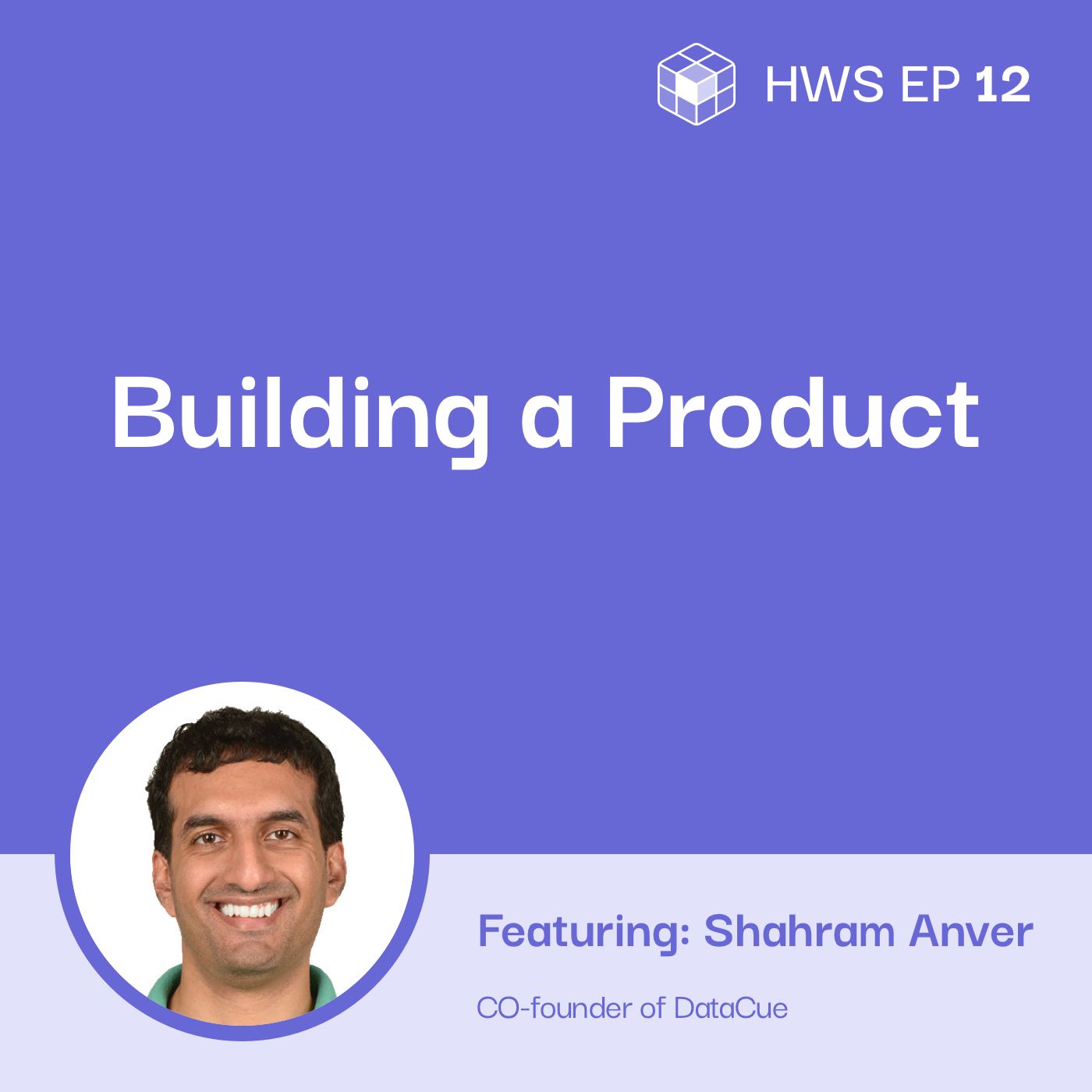Listen on:
Table of Contents:
Have you thought about starting your own company but have hesitations? Do you have a concept but aren’t sure if you should pursue it?
Well, on today’s episode, I interviewed Shahram Anver, CTO and co-founder of DataCue (a software solution that creates personalized experiences for your customers across your website and email).
He came on the podcast to talk about how he started DataCue, what advice he has for brand new entrepreneurs, his take on hiring remote workers, and the lessons he has learned from running a SaaS startup and going into business with his wife.
How would an entrepreneur go about starting a business?
Speaking strictly from a B2B perspective, Shahram says that one of the best advantages businesses have is that it can be difficult to get a meeting with someone, in order to get good feedback but once you do get that meeting, the feedback is on point.
Since Shahram and his business partner both came from consulting backgrounds, it seemed natural for them to have the idea of coming up with a more intelligent version of Google Analytics.
I don’t think this process ever stopped. And I think when you stop, that’s when you’re in trouble because the moment when you can get somebody who cares enough about the problem, then they’re just going to flood you with feedback and that’s really what you want.
The tools Shahram used to get to where they are today
Shahram and his business partner wanted to make a better, more intelligent version of Google Analytics and in the process, they didn’t actually use Google Analytics. Perhaps it was Shahram’s engineering background which led them to build their own version, their own way. They used Google Analytics as an example of what to do (but also what not to do) when they built their own javascript library, got the data collection to work, and built the algorithm themselves.
Because of that, they used many “low level” tools instead of commercial products. However, Shahram did utilize a service called Webflow which helps their customers build websites that is completely visual. Webflow was helpful for Shahram because he was focused on building sites and coding for his clients, he didn’t have the time to code his own site which marketed his product. Webflow allowed Shahram’s designer to build the site herself, which freed up his time so he could better develop their product.
Should entrepreneurs consider hiring remote workers?
If your business is based around physical products, it is going to be more difficult to have you and the rest of your staff work remotely, from different sites. In cases like that, Shahram suggests building your company and products locally, making a name for yourself there, then expanding to other sites after you have built a good framework and a solid foundation of repeat customers.
The cool thing about digital is that the whole definition of a market is changing quickly.
When it comes to SaaS, we can’t define ourselves by a local market. Shahram points out that there is no difference serving a Singaporean customer versus a Chilean customer or a Ukrainian customer. Location doesn’t matter when it comes to digital products. Instead of geographical boundaries, he defines their customers and market based on platforms.
If you have the opportunity of not being geography-bound, then absolutely, I think you should look outward.
Shahram suggests, if you are going to hire remote workers, why not go 100% remote? In his eyes, the people who work on-site have an unfair advantage of being able to access more tools or more information than that of the people who work remotely, and why give anyone on your team an unfair advantage over others?
The only caveat Shahram sees is the situation of needing local knowledge. If you have a product or service which needs local information based on one geographical location, then it is important to hire someone from that specific location. For Shahram, that meant hiring someone from Chile because he needed local connections to make progress in terms of funding, early on in the development of DataCue.
You just have to dive right in and get it done and figure it out.
Shahram’s Entrepreneurial Mindset
Shahram tends to be a more positive optimistic person. He is also in a unique situation since his co-founder is his wife and is a much different thinker. Because of their differences, they are able to prop each other up in times of hardship. He is a big proponent of having a business partner, which is why he offered this Chinese proverb for guidance:
“If you want to go fast, go alone. If you want to go far, go with someone else.”
Of course, finding that balance between personal and professional is important when it comes to being business partners with your significant other. Shahram had heard from potential investors that having a business partner that you are married to is a big red flag. This is why Shahram suggests having strict rules and serious discussions about boundaries when it comes to going into business with your significant other.
Shahram’s backstory
Shahram has a data science background from when he worked for Trip Advisor. Even back then, he made it clear, that he was looking to own his own business and build something which would allow everyone to enjoy the benefits of machine-learning.
When you do solve your own problems, you need some sort of metric to know that your problem isn’t that niche.
What is DataCue and what do they do?
Shahram and DataCue aim to improve conversion by 30% by showing each visitor to your website, the portion of the site that they are most interested in. This is the equivalent of going to a store and telling a clerk, “I’m looking for some jeans,” and the clerk immediately takes you to the jeans department. Essentially they are trying to make the website experience (which is virtually the same for every visitor) into the in-store experience, which is personalized. DataCue aims to help eCommerce entrepreneurs automate onsite conversion with minimum work required. We are integrated into Magento, Shopify, WooCommerce, and Prestashop.
The best example of this process in progress is YouTube and Netflix. Both of which, show you examples of videos based on the videos you have watched in the past. This sort of pattern recognition is the future of websites. The process is easier when there are only a few products on your site but gets much more complicated when the number of products you sell or offer jumps to 1,000 or more.
If you want to go fast, go alone. If you want to go far, go with someone else.
– Shahram’s personal mission statement
What are some of resources Shahram suggests for listeners?
Shahram loves the Y Combinator (YC) YouTube channel which is a wonderful free tool for any entrepreneur looking to start or develop their startup. In addition, they have a great program called the YC Startup School.
In addition to Y Combinator, he suggests just taking the risk and diving in. If you build a prototype and ask for feedback, you will be able to get much more useful information and feedback versus going up to people with only an idea. You can also build more substantial conversations and connections because you have something concrete to show people.
This interview is part of the How We Solve podcast. To hear more from industry experts who are solving everyday business problems, check us out on Spotify, Apple Podcasts, and on our website.
About the guest

Shahram Anver
Shahram Anver used to work for IBM and TripAdvisor before deciding to start his own business with wife, Ann. Together they built DataCue, which aims to help small companies use their data to improve their business.
How to reach Shahram:
- LinkedIn: Shahram Anver
- DataCue website
- Via email shahram@datacue.co
Listen on:
